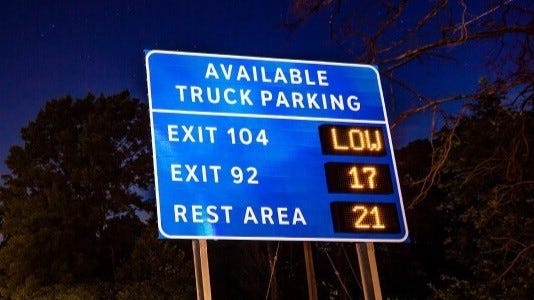Finding Common Ground in The Truck Parking Dilemma
The trucking industry has reached a tipping point in the debate over truck parking. With rising operational costs, shrinking margins, and new players like Truck Parking Club offering access to reserved spaces, the debate over free vs. #paidparking is gaining momentum. The issue isn’t just about parking spots it’s about balancing driver needs, property rights, security, and fair compensation.
Technology makes it easier than ever for drivers to find parking.
But the question remains: Should drivers have to pay for services like Truck Parking Club? And where should we draw the line between fair compensation for spots and overcharging drivers for necessities?
Technology Offers Options, But Convenience Comes at a Cost
With a smartphone at every driver’s fingertips, there are countless ways to locate parking areas, from Google Maps to dedicated apps, but the reality of trucking isn't always that simple. After a 14-hour shift, the last thing many drivers want to do is hunt down parking. Fatigue, safety concerns, and reg requirements limit how far drivers can push their schedules, making services like Truck Parking Club appealing.
Truck Parking Club provides more than just a place to park. It offers security, convenience, and peace of mind. For some drivers, the ability to skip the hassle of parking searches is worth the fee. After all, convenience comes with a price, and it’s fair for property owners and companies to be compensated for providing a valuable service.
At the same time, it’s important to recognize that truck drivers shouldn’t be nickel-and-dimmed for every service they use, need, or buy and should definitely not be gauged over it. Trucking already comes with significant expense, including fuel, taxes, and maintenance, not to mention the stress of long hours on the road. Striking a balance between providing essential services and overcharging drivers is critical for fairness.
Respect for Both Sides of the Issue
I'm a driver, I still drive. I've been licensed class A for over 20 years and have every endorsement. I am also a risk and compliance guy who formerly owned a brokerage and a carrier fleet, so I see it in just about every way.
The sentiment that "just because we’re truck drivers doesn’t mean everything should be free" reflects an understanding that businesses need to make a profit but not at the driver’s expense. While some argue that all truck parking should remain free, others see value in reliable paid services that remove the guesswork from finding a secure spot.
The industry needs to reach common ground, and industry stakeholders need to be open-minded to alternative solutions and possibilities, and that includes drivers understanding that other businesses have their costs as well. Here are some ideas to help balance both perspectives:
Incentive-Based Parking - Much like fuel credits for free showers, truck stops, and parking services could offer reserved parking in exchange for purchases. This way, drivers benefit from services they already need, and businesses maintain their revenue streams.
Dynamic Pricing Options - A tiered pricing model could allow some parking spaces to remain free while offering premium options for those who want added security. Some truck stops were already charging even before Truck Parking Club existed. It is reserved parking. During off-peak hours, prices could be reduced to accommodate drivers on tighter budgets.
Carriers Covering Parking - Costs As some carriers already cover parking fees for their drivers, more fleets could absorb these expenses as a standard practice. This would reduce the financial burden on drivers and encourage fleets to prioritize safe, secure parking options.
Government-Industry Collaboration - Public rest areas should remain accessible to all drivers. Still, governments could partner with private companies to expand parking capacity without converting public spaces into exclusively paid lots. Incentives for property owners could also encourage more parking development.
The Value of Paid Parking
The beauty of services like Truck Parking Club is that they offer drivers a choice. If drivers prefer to plan their route and find parking independently, they have that option. For those who value the convenience and security of reserved parking, services like Truck Parking Club provide a viable solution.
What’s important is that drivers feel respected, not exploited. Paid parking should be seen as one tool in a driver’s toolkit, not an obligation or an unfair burden. While truck stops should maintain free parking options, it’s reasonable for businesses to charge for added convenience and security.
The issue isn’t just about parking it’s about respecting the truck drivers who keep the economy moving while recognizing that businesses and property owners also need to be fairly compensated.
The truck parking debate emphasizes bigger industry challenges like tight margins, high costs, and the need for more sustainable solutions. Drivers shouldn’t expect everything to be free, but they should not be overwhelmed by hidden fees and added costs for every service they rely on.
The key to resolving this debate lies in open dialogue and creative solutions. The industry must embrace flexibility, collaboration, and fairness, ensuring drivers and businesses thrive. Whether fuel-based incentives, tiered pricing, or carrier-sponsored parking, there’s room for innovative solutions that meet everyone’s needs.
Truck drivers deserve access to safe, secure parking without unnecessary financial stress, and businesses deserve to profit fairly from their services. With the right balance, paid parking can complement free parking, and the industry can move toward a more sustainable and respectful future for everyone on the road.


